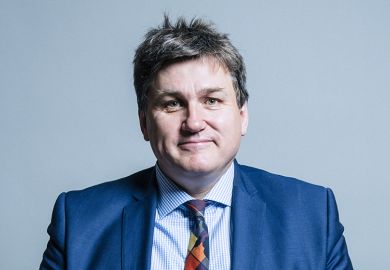The president of Universities UK has called for a “national conversation” on a “long-term funding solution” for higher education, while urging the new Westminster government to “lean in” to the cost-of-living crisis with the return of maintenance grants for those in greatest need.
Steve West, vice-chancellor of the University of the West of England, gave his speech to UUK’s annual conference as the new government led by Liz Truss forms, with big concern for universities over how to meet a cost-of-living crisis biting for staff and students, while dealing with their own rising costs. At the same time, English universities’ funding is being reduced by the continuing freeze in the tuition fee cap.
“We must find a long-term funding solution for UK universities and not limit and crush future opportunities,” Professor West told the conference, held at the University of Leicester.
“We are open to exploring a range of possibilities and working with governments, students and staff to find ways of funding higher education. This national conversation should take place in parallel with the government’s plans to build a more flexible lifelong learning system.”
There was a need for debate across the UK nations, not just in England, Professor West said.
“We need a long-term sustainable funding approach that creates long-term stability, is affordable and sustains across government departments and political parties,” he added. “Education is too important to plan on the basis of parliamentary terms or to be determined by short-term political whims.”
He also warned that by 2024-25 the £9,250 fee cap in England “will only be worth £6,600 in 2012-13 prices” – when the current system was introduced.
“We are being squeezed and we are being squeezed hard,” Professor West said.
He also urged the new Westminster administration that “this government needs to face up and lean into to the cost-of-living crisis now faced by students and staff. It is hitting them hard”.
“In our conversations with new cabinet members and ministers in the coming weeks, we will urge them to provide additional government money for hardship funding and reinstate maintenance grants for those most in need,” he continued. “Failure to engage with this will lead to significant health and well-being challenges as well as educational impacts.”
Professor West also addressed concerns that a Truss government set to use public spending to deal with the energy crisis may not meet the Johnson government’s pledge to mount big increases in research spending – or commit funds to associating to the European Union’s Horizon Europe research programme.
The government “must recommit to meeting the target of spending 2.4 per cent of [gross domestic product] on research and development and continuing to do all it can to secure association to Horizon Europe”, he said.
“Our sector has been responsible and pragmatic in working with the government to explore alternative funding mechanisms should association prove impossible, but we must ensure that we hold the government accountable to delivering every promised pound in the event of non-association. Research spending must not be treated as low-hanging fruit when difficult fiscal decisions are taken.”
Register to continue
Why register?
- Registration is free and only takes a moment
- Once registered, you can read 3 articles a month
- Sign up for our newsletter
Subscribe
Or subscribe for unlimited access to:
- Unlimited access to news, views, insights & reviews
- Digital editions
- Digital access to THE’s university and college rankings analysis
Already registered or a current subscriber?








